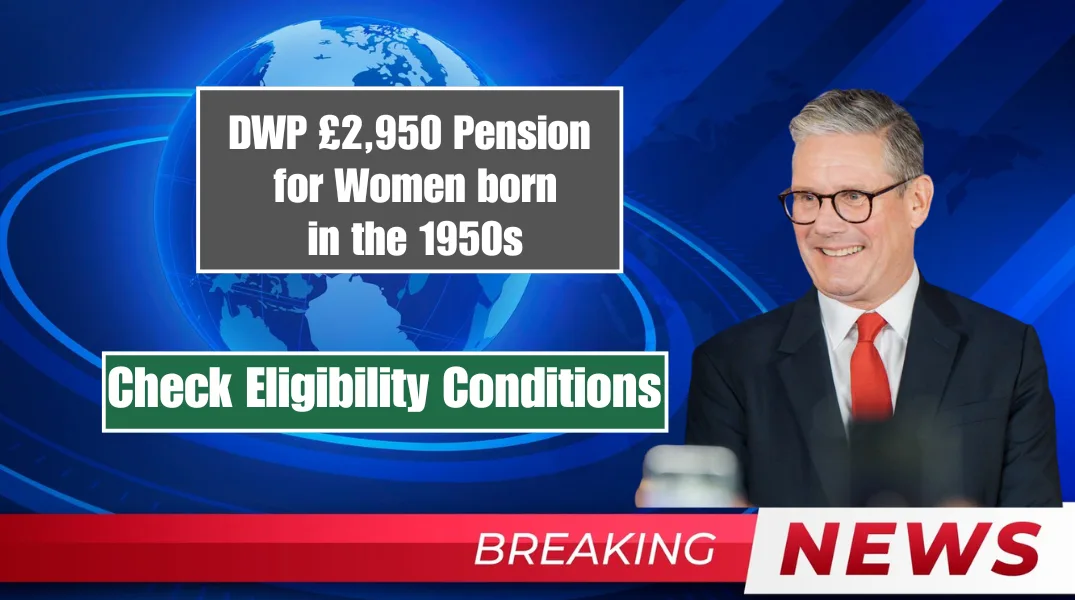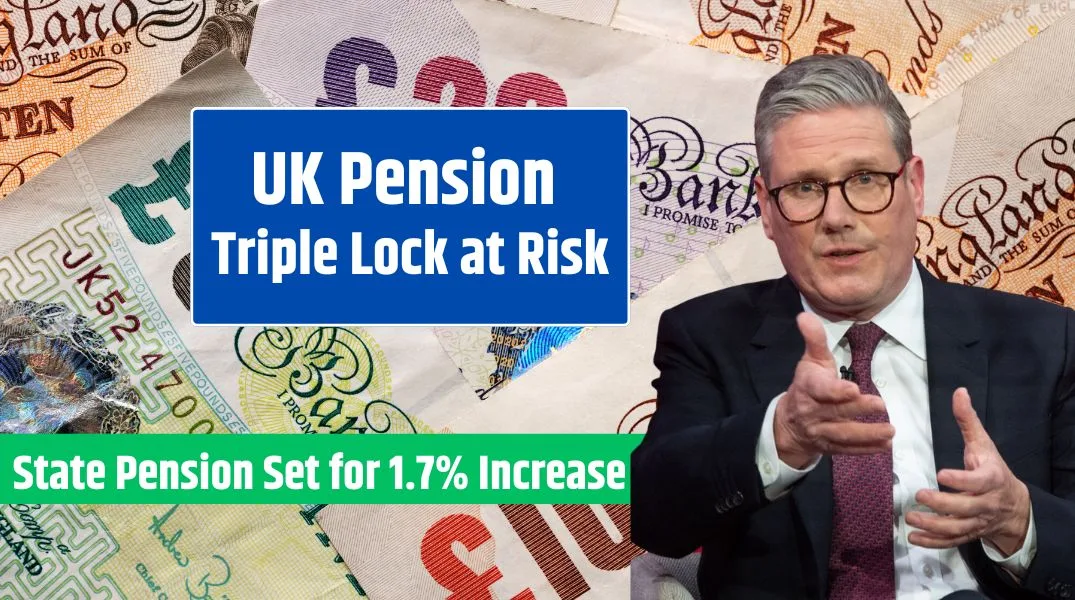DWP £2,950 Pension for Women born in the 1950s: The Women Against State Pension Inequality (WASPI) campaign is once again in the headlines, as the Department for Work and Pensions (DWP) has released a fresh statement just hours before a critical deadline. This comes after WASPI campaigners took a strong legal stand, demanding justice and compensation for women born in the 1950s affected by sudden changes to their state pension age.
Who Are the WASPI Women?
WASPI stands for Women Against State Pension Inequality. These are women born in the 1950s who were hit hard when the government raised the state pension age to equal that of men — from 60 to 65, and later to 66. Many of these women say they were not properly informed about the changes and faced financial hardship as a result.
Also See:
What Did the DWP Say?
In a recent official statement, the DWP said:
“We do not comment on live litigation. We accept the Ombudsman’s finding of maladministration and have apologised for there being a 28-month delay in writing to 1950s-born women.”
However, the DWP also defended itself by saying that:
- By 2006, 90% of women born in the 1950s knew about the state pension age change.
- Only one in four women remembered reading official letters about the change.
- The Government believes it cannot justify spending £10.5 billion on a compensation scheme, saying it would be unfair to taxpayers.
Why Are WASPI Women Taking Legal Action?
The WASPI campaign argues that the government’s response is unfair and legally wrong.
- The Parliamentary and Health Service Ombudsman (PHSO) had found that women affected should receive compensation — with suggested amounts of up to £2,950 each.
- Despite accepting that there was maladministration in how women were notified, the Government refuses to offer compensation, claiming no real injustice was suffered.
Angela Madden, Chairwoman of WASPI, strongly disagreed with this position, saying:
“The Government has accepted that 1950s-born women are victims of maladministration, but now says none of us suffered any injustice. We believe this is not only an outrage but legally wrong.”
What Happens Next?
To push their case forward, WASPI campaigners have:
- Sent a “letter before action” to the DWP, warning that if the issue isn’t resolved, they will take the case to High Court.
- Launched a £75,000 Crowdjustice campaign to raise funds for the legal battle.
- Given the DWP 14 days to respond, a deadline that passed two weeks ago, putting even more pressure on the government.
Ms. Madden added that the “gaslighting” of WASPI women by the government will not go unchallenged, showing their determination to fight for justice.
Government’s Reason for Refusing Compensation
The main reasons the Government is refusing to pay compensation are:
- They believe most women were aware of the pension changes.
- They argue that such a large payout would unfairly burden taxpayers.
- They claim that although there was a delay in communication, it did not cause serious injustice.
The WASPI fight highlights a larger debate about fairness, government accountability, and justice for women impacted by sudden policy changes. With the DWP standing firm and WASPI women ready to take legal action, the next few weeks could see significant developments in this long-running issue. Whether the High Court will get involved now depends on how the government responds — and WASPI supporters are watching closely.
FAQ
What is the WASPI campaign about?
WASPI (Women Against State Pension Inequality) is a campaign fighting for justice and compensation for women born in the 1950s, who were negatively impacted by sudden changes to the state pension age. They argue that many women were not properly informed of the pension age increase, causing financial and emotional distress.
Why is the UK government refusing to compensate WASPI women?
The government admits there was maladministration in informing women about pension changes but refuses to compensate, claiming that by 2006, 90% of 1950s-born women knew about the state pension age rise. They argue that a £10.5 billion compensation scheme would be too expensive for taxpayers.
How much compensation are WASPI women asking for?
The Parliamentary and Health Service Ombudsman has suggested that each affected woman should receive up to £2,950 in compensation. However, the UK government has rejected this recommendation, leading WASPI to consider legal action.
Is WASPI taking legal action against the UK government?
Yes, WASPI campaigners have sent a ‘letter before action’ to the Department for Work and Pensions (DWP) threatening High Court proceedings if the matter is not resolved. They have launched a £75,000 crowdfunding campaign to support their legal fight.
What is the current status of the WASPI legal fight?
WASPI gave the DWP a 14-day deadline to respond, which passed two weeks ago. They are now preparing to escalate the case to the High Court, as no resolution has been reached. More updates are expected soon as campaigners push forward.














This government will delay, delay, delay as long as they possibly can. Why? Because up until November 2024, over 300,000 WASPI women have died. More WASPI women die each day. The DWP know this, and will drag their heels and slow things down in order to save as much money as they can.
I have nothing but a basic state pension. I planned to work until I was 67 to save my pension for 7 years as my support, I get nothing in top of my pension of £902 a month, won’t give me pension credit or cost of living allowance. I get nothing
Hello Elaine,
Have you sign the petition for Waspi?
I wanted to retire early because my husband has health issues but had to keep working and retired at 66 I also have osteoarthritis and it was difficult sometimes to do my job just pay us the money we are owed so we can at least live a bit without worrying
Most of us have all been mothers not always able to pay into pension at work or private pensions like men If we had had more notice at least 10 years or more even if you were broke could have tried at least savings to help with retirement but a year or so before Should have retired on state pension change the rules. When you times extra 6 years by the yearly pension it is a lot of money by every women entitled it is just the government stealing as much money as they can off of mothers
Totally Agreed Julie
I am one of the wemen born in 1950. I broke my leg in 2017 and struggled to continue working, but my recovery was difficult. Whilst recovering I checked my state pension date to claim as I decided to retire to enable my leg to heal, as going to work was causing me a lot of distress from constant pain and the fact that I had to travel by public transport daily because my car insurance provider would not cover me. This assabated my health and I decided to call it a day at: 59, thinking that I would be ok with my work pension and my state pension. I got a rude awakening when I enquired on how to make my claim. That was when I discovered that my state pension age had been increased from 60 – 66. I retired to recover, but the work pension was not enough to meet my expenses so I had no choice but to return to work and have been doing to date. I need to know how to claim for compensation as I have been trying to work to clear by debts so I have not had a chance to pursue this. Please advise me on what to do.
I was never informed that I would not get my state pension at 60yrs I was shocked I carried on qorking few hours a days I had no option asy husband was the only earner paying our high mortgage we borrowed money every month to survive I had ostioartheritus pmy autominpne decease highblood pressure ashma ete we found it veryhard every month alway borrowing money every month to get by
Not enough 11.000 x 6 = 66000